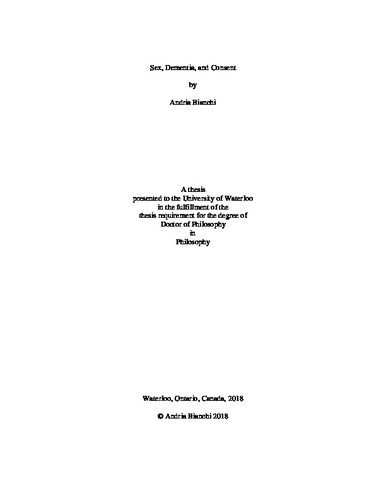| dc.description.abstract | Sex and dementia is becoming an increasingly important topic in applied ethics. By the year 2030, more than 74.7 million people are expected to be diagnosed with dementia worldwide; many of these people may want to engage in sex. The question of how to manage cases of sex and dementia is occurring more frequently in practical cases because of our aging population. The primary reason that sex and dementia is ethically complex is because sexual consent is both legally and morally significant, yet many people with dementia may be unable to consent in accordance with current standards.
In this dissertation, I introduce three frameworks that could be used to approach cases of sex and dementia. The first framework is that of relational autonomy and supported decision-making; this framework tries to enable people with dementia to make autonomous sexual decisions with support. The next approach is a framework of advance sexual consent, which considers the relevance of prior autonomous sexual decisions. The third framework focuses on prioritizing well-being above a person’s capacity to make autonomous decisions and to consent to sex. I assess each framework and consider their positive and negative nuances. The overall goal is to balance the right to sexuality while at the same time protecting people with dementia from undue harm.
Ultimately, this dissertation shows that cases of sex and dementia ought to be managed on a case-by-case basis; one framework will not work for every context. In order to approach situations on a case-by-case basis, I contend that a process of weighing and balancing norms and principles is necessary. I use Beauchamp and Childress’s method of weighing and balancing to propose a systematic procedure. This process takes various factors into account in order to determine how to proceed in an ethically defensible manner. According to an approach of weighing and balancing, sexual acts would not be immediately barred based on a person’s inability to consent; rather, a person’s present convictions, the sexual activity to which they want to participate, the possibility of experiencing undue harm, their prior wishes and values, their capacity to make autonomous decisions with support, etc. would all be considered.
Overall, this dissertation contributes to the complex topic of sex and dementia and offers a starting point for further discussion on how to approach these cases in practice. | en |

